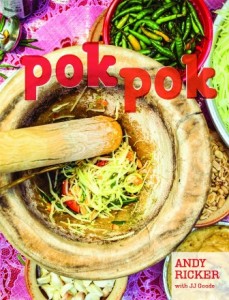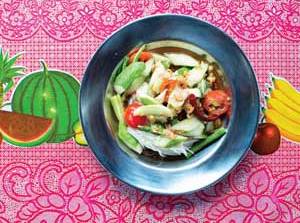(by Corbo Eng)
This is not a dry, perfunctory cookbook. Its goal, as any cookbook’s is, is to instruct; but, one cannot escape the fact that it also exists to document Andy Ricker’s remarkable, decades-long odyssey into Thai food and culture. Assisted by his collaborator, JJ Goode, Ricker does an excellent job of telling the essential back stories and weaving the indispensable vignettes that bring his food to life.
In selected points in the book, the reader is introduced to the supporting cast. First, there is Sunny, Ricker’s friend of fifteen years and his “go-to guy in Chiang Mai” who has become a de facto “older brother.” Then, there is Da Chom who is a revered, sagely Jedi-like master who not only teaches Ricker how to make “laap” (Thai minced meat salads) but serves as the archetype of the homespun expert. Mr. Lit, a plucky restaurateur who learned to make Isaan-style grilled chicken (and who dedicated his life to it), is spotlighted as Ricker’s “chicken mentor.” Their contributions inform the recipes in intangible ways as they populate Chef Ricker’s amazing travels.
But, the storytelling doesn’t end there. Each recipe is graced with an opening salvo complete with Mr. Ricker’s reminiscences about the dish in question, places where he’s encountered it, and versions that have inspired him. For example, we hear of Ricker’s encounter with “tam taeng kwaa” (Thai cucumber salad) at a remote, rural crossroads where locals fed him this dish and, with some seriousness, wanted him to marry their daughters or about trying a curiously black custard in Chiang Mai made, incredibly, with actual charcoal before falling for “khanom bataeng laai,” a custard infused with a more palatable fragrant melon.
The recipes themselves (like signposts along the journey), after such set-up, are meticulously written with detail and careful consideration. Both Mr. Ricker and JJ Goode know their audience, as skillful writers always do, and invariably inject the book with both directions and invaluable explanations. In making “laap meung” (minced pork salad), for instance, the reader is not only told to combine lemongrass with raw pork blood but to “use your hand to squeeze and squish the lemongrass stalk for about a minute.” Why? “You’re helping to release the essence of the lemongrass, which tones down the flavor of the blood and keeps the blood liquid.”
Then, when finally chopping the pork to mince it (in that characteristic act that defines the dish), Ricker and Goode tell the reader to “pretend you want to hack a medium-size carrot into two pieces…rely on your wrist for motion and the weight of the knife for most of your power.” It’s hard not to exert just the right amount of gentle force. Indeed, great care is given to guide the home cook, a likely novice, through anything that would be expectedly unfamiliar. But, this example is not exceptional. Each recipe utilizes the same helpful, highly informative prose.
Ultimately, with the addition of Austin Bush’s rich, understated photographs that complement and enrich the text, Pok Pok: Food and Stories from the Streets, Homes, and Roadside Restaurants of Thailand is as rewarding a Thai cookbook as there is currently available in English. It is a must-read for fans of Mr. Ricker’s or of his restaurants. As an entry into Northern Thai cooking, it is a one-of-a-kind masterwork from a man who is uniquely qualified to tell the story of this wonderful cuisine.
Copyright 2013 (Corbo Eng). All rights reserved.




